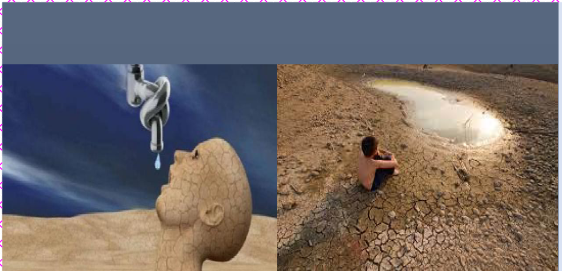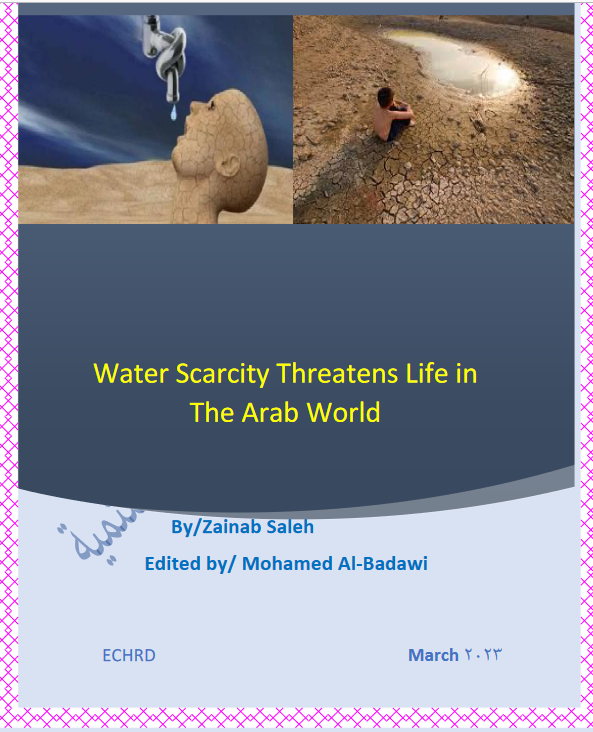Press Release
………………………………………………
On 22 March, 2023, on World Water Day, the Egyptian Coalition for Human Rights and Development (ECHRD) issue its report on water scarcity threatening life in the Arab world. It explains through several axes the issue of water scarcity in the Arab world, represented in defining water scarcity, identifying its causes and clarifying its harm to different aspects of human rights, presenting examples of some countries in the Middle East that suffer from this crisis and its impact on them, as well as, mentioning some international and Egyptian efforts to confront water shortages and finally, making some recommendations.
This issue occupies the sixth goal of the United Nations Sustainable Development Goals (SDGs) for 2030. It is one of the most important issues of concern to many Arab countries. Water is one of the most important natural resources in human life, and life cannot develop without it. The distribution of water, its quality and its use changes within one country or one region. The Arab world suffers from a water crisis compared to other countries in the world. This is related to the geographical and geological reality of the Arab world. Its climate is arid and semi-arid, characterized by low rainfall and high temperatures.
Scarcity is one of the most important aspects of this dilemma, as fresh water is a scarce resource. No more than 2.5% of the water on the planet is fresh water, suitable for human consumption. Most of it is inaccessible, as about 70% of it is trapped in glaciers snow and ice. The largest source of fresh water is groundwater, while rivers, streams and lakes contain only 0.3% of fresh water.
A French ministerial report pointed out that 15% of the countries of the planet receive more than 50% of their water from other countries and two out of three from the major rivers or underground wells. This means that more than 300 in the world are shared among several countries. The international consulting firm, PricewaterhouseCoopers (PwC) believed that the conflicts would intensify due to the water shortage. This is expected to affect nearly two thirds of the world’s population in 2050. The most threatened regions are the Middle East. The PwC wrote that, in this regard, two-thirds of the water consumed in Israel comes from the occupied territories. Nearly half of the Israeli financial facilities are located in areas that were not within the borders of the Jewish state before 1967.
The report concluded with a set of recommendations as follows:
- Transition to modern irrigation systems to save water wasted in traditional irrigation systems. This requires a plan to commit farmers to modern irrigation systems, while providing the necessary financing for the establishment of such networks.
- Coordination of water policies with population and environmental policies in every Arab country, developing structures related to benefiting from rainwater to limit water and benefit from it without wasting it or leaking into the sea, while taking into account the environmental aspect in achieving this.
- Desalination of seawater, raising its efficiency, reducing its costs, and paying attention to scientific research to develop water desalination as one of the ways to face water scarcity.
- Take care of the technology needed for the desalination process by localizing, developing and producing this technology locally and adapting it to be economical when implemented.
- Development of legislation and regulations, forming control bodies over the use of groundwater, monitoring the drilling of wells and the quantities of water pumped from them and that some Arab countries are not over-withdrawing it, to fill the deficit in surface water, protect it from pollution and preserve the reserves of it without running out.
- Development of a water strategy by the competent institutions in the Arab countries to determine the policies and procedures to achieve water development, adopting it among the priorities and programs to confront the negative effects resulting from the limited water.
- The need to increase investments in the water sector to renew and expand distribution and transportation networks, preserve water from wastage, waste and pollution, and raise awareness about water use through the media.
- The importance of improving the management of water institutions through the development of human resources, of education structures and training systems, and the improvement of management methods, institutional structure, and legislative systems.
- The restriction of water management to a central authority to avoid the occurrence of subsequent problems that happens whin distributing it to multiple parties, making it difficult to coordinate, especially with regard to planning and an integrated view. Water, environment and sanitation are indivisible if we take into consideration ensuring the sustainability of water resources.








